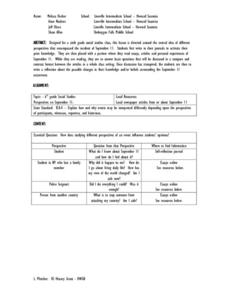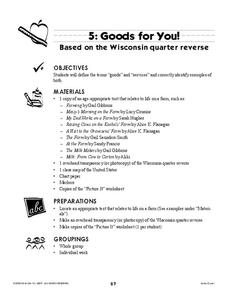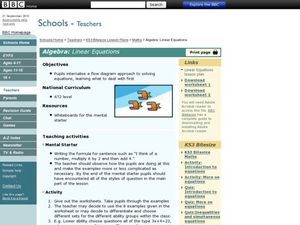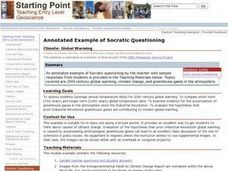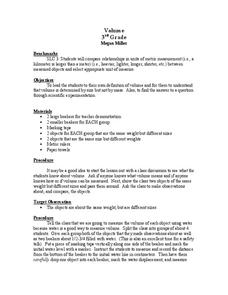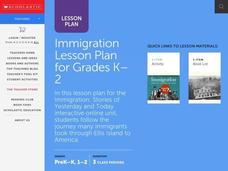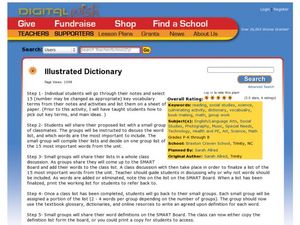Curated OER
Mural Mania
Learn about your home state. After listening to stories about your state, identifying symbols, and discussing what makes your region special, your class creates a mural.
Curated OER
The Incident of September 11th
Sixth graders identify and write in their journals in order to activate prior knowledge on the events that surround September 11th. Students, with a partner, read various essays, articles and personal experiences of September 11....
Curated OER
What Do Writers Do?
Pupils learn about honing their writing through editing. They write the beginning of a story, paying attention to vocabulary and detail. Then they split into groups of two to peer edit. After discussing ways they can improve their...
Curated OER
Classroom Comparison of Fat Intake
Students bring in their fat diaries and work in pairs to calculate their average fat intake per day during the week of data collection. The whole class gathers to calculate their total fat intake and average fat intake per student per...
Curated OER
Who Controls the Real Cost of Credit Cards?
Students view the film "How Much Does Debt Cost?" and explore the reasons why credit card fees and interest rates have gone up so much over the last 25 years. They participate in class discussion and complete a worksheet.
National First Ladies' Library
Colonial America: The Original 13
Middle schoolers work in small groups to research the initial history of two colonies and answering a list of questions. They then prepare a PowerPoint presentation or poster that includes all the findings of the questions and share...
Curated OER
"How Many Names for 100?"
Fifth graders work on the different possibilities of reaching the number 100. The class is divided into homogeneous groups for cooperative learning. The activity uses discussion questions to help with problem solving.
Curated OER
Irony in Poetry and Prose (Fiction and Non-fiction Texts)
Middle and high schoolers examine the impact of irony in poetry and prose. In this figurative language lesson, they read instructor-selected literature and identify uses of irony. Then they discuss how irony enhances literature.
Curated OER
Goods for You!
Have your class learn about Wisconsin and farming. Learners begin by listening to stories that describe farming and engage in a discussion of goods and services. They could also compare the goods and services provided in different states.
Curated OER
Algebra: Linear Equations
Students investigate the mathematical concept of linear equations. They use codes to lead the discussion. The teacher makes clarification as necessary during the class discussion. The activity includes dialogue to be used by the teacher.
Curated OER
Annotated Example of Socratic Questioning: Climate: Global Warming
Students compare and discuss short-term and longer-term global temperature data. They evaluate data from three sets of graphs and then participate in a structured whole class Socratic discussion on the possible causes of climate change.
Curated OER
Introduction to Indians and the First Thanksgiving
Students use yarn to create a timeline of the first Thanksgiving. After a class discussion, they view pictures of artifacts and Native Americans to identify the tools and items present during the first Thanksgiving. In groups, they...
Curated OER
The Queen of Sheba
Young scholars discuss various versions of the myth of The Queen of Sheba and the basic characteristics of myths. They research how different cultures interpret the story and include it in their religious beliefs. They create projects...
Curated OER
Volume
Third graders complete scientific investigation to determine what volume is and how it is determined by size not by mass. They discuss what they know about volume before proceeding with the demonstration and experimentation. After the...
Japan Society
Individual and Society: Natsume Sôseki and the Literature of the Early Twentieth Century
Combine literature and history by examining the work of Japanese writers after the Russo-Japanese war. This resource is for advanced classes with an interest in how literature reflects and reacts to societal change. Activities outlined...
Curated OER
Scarcity and Choices
First graders gain an understanding of the scarcity of resources and how it affects the choices that we make in our everyday lives. Students will participate in a variety of activities such as literature analysis, shopping, journal...
Curated OER
Thanksgiving: Multiple Perspectives
Students examine different perspectives about Thanksgiving that include those of the European Settlers and the Native Americans. They read and discuss an article about Plymouth being "America's Hometown." They develop a landmark for...
Curated OER
Immigration For Grades K-2
Students engage in a lesson about the concept of immigration. They conduct research using a variety of resources. The information is used in order to create context for class discussion or a class presentation topic. They also read...
Curated OER
Is the media aiding Global Peace when reporting on religion?
Students play 'telephone' to simulate communication difficulties. In this media analysis instructional activity, students read and analyze newspaper articles related to religious tensions between the Pope and Muslims. Students evaluate...
Curated OER
Patriotism and Foreign Policy
Twelfth graders create a museum of Patriotism and Foreign Policy. They participate in discussions and work in committee's to determine which objects shall be displayed in the museum. They present visual and performing arts along with...
Curated OER
Square Numbers Closure Activity
Students discuss square numbers. In this math lesson, students find square numbers and support their answers. Students find sums and products that are square numbers.
Curated OER
Illustrated Dictionary
Young scholars make an illustrated dictionary of words they've used and learned in class. In this vocabulary lesson, students find words from their notes, discuss the words in a group, select the best words as a class, and complete an...
Curated OER
The Human Mind
Young scholars read and discuss twin studies to explore the debate of nature vs. nurture. They create a list of characteristics and then look for evidence of whether it is primarily a genetic or environmental characteristic. All of the...
Curated OER
The Debate over Guest Workers Programs
Eleventh graders examine various immigrant stories. In this American History activity, 11th graders discuss the different proposals for the guest-worker programs. Students debate this system as a whole class.



